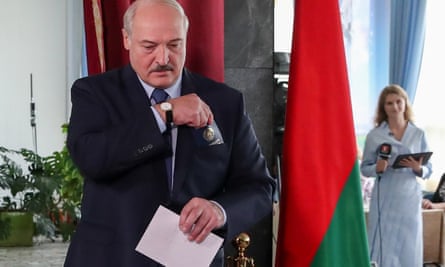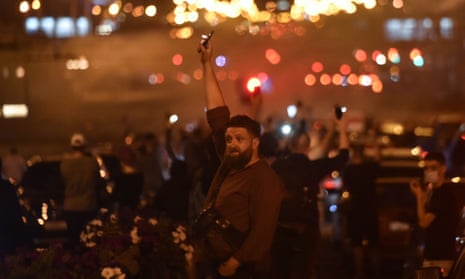As he fights for his political survival, Alexander Lukashenko has taken a big gamble by cutting off the internet across most of Belarus.
Belarusians seeking to protest against his government have been mostly cut off from the outside world: mobile internet has been throttled and popular messaging apps have been disabled, leaving demonstrators scrambling to find wifi connections and working VPNs or proxies to get online and then sharing what news they can find.
The internet blackout, which Lukashenko hopes will disrupt the protests against him for mass vote-rigging in last week’s presidential elections, is a rare example in modern Europe of government voluntarily knocking its entire country offline to stifle dissent.
Quick GuideWhere in the world have governments imposed internet and telephone blackouts?
Show
Governments around the world have used internet blackouts, or blocked popular platforms such as WhatsApp, at times of political crisis. Several countries have also used temporary outages to try to foil cheats in national exams.
Netblocks monitors outages worldwide, and has recorded dozens of cases this year alone. But it is rare for all communication, including phone lines, to be severed. Countries that have limited their citizens’ communications, both temporarily and long-term, in recent years include:
- India partially restored internet access in Kashmir in January 2020 after an unprecedented five-month blackout, but only for institutions providing “essential services”, while social media sites were still be banned. In March restrictions were lifted further. All mobile and broadband internet connections had been suspended when the government revoked the decades-long special status of Jammu and Kashmir, which had given the region autonomy.
- Belarus president Alexander Lukashenko shut off internet access in August 2020 in the hope of stifling dissent following the disputed presidential election.
- North Korea is probably the most isolated country in the world. Its people cannot make or receive international phone calls, or access the global internet. Mobile phones operate on a closed domestic network, and North Koreans can only surf a highly restricted national intranet.
- Xinjiang region in western China was largely isolated for 10 months in 2010. After riots, Beijing blocked internet access and barred international phone calls. Since then an unprecedented surveillance system has been put in place that allows authorities to monitor residents’ phone and internet use rather than blocking it entirely.
- China has blocked its internet off from the rest of the world wide web with digital barriers known colloquially as the ‘Great Firewall’. Companies that are a staple of digital life elsewhere, including Facebook, Google and Amazon, are blocked and unknown in China. However the controls can be dodged with a VPN, and phone connections to the rest of the world are open.
- Sudan had a month-long internet blackout during mass demonstrations this year. Other countries have shut down the internet or blocked major sites during times of political tension, including Zimbabwe during fuel price protests this year and Uganda for the swearing in of a president whose re-election sparked protests.
- Iraq, Algeria and Ethiopia are among several countries that have temporarily blocked the internet to prevent cheating in national high school exams. These blocks have usually only lasted a few hours.
The lack of internet has left protesters in an information vacuum. Popular independent news sites, including Tut.By and Naviny, have been kept largely offline since election day and television news is dominated by the government.
“This long-lasting internet blockage is unprecedented,” said Katsiaryna Shmatsina, a political analyst at the Belarusian Institute for Strategic Studies, noting that the internet was being blocked for longer and more aggressively than at protests in previous years. On Tuesday, there were unconfirmed rumours that the country could cut phone and internet traffic entirely.
With people unable to reach one another, protests have largely relied on popular bloggers on Telegram channels, some anonymous and located outside the country, who suggest meeting points for demonstrations and share videos of protests and breaking news, some of it unverified, that manages to filter through the blockade.
The largest is Nexta, which has more than 1,151,000 subscribers, and has been a key clearing house for videos from this week’s protests and for instructions to protesters. On Tuesday evening, it told its readers to meet at 7pm in small groups of less than 20 and to occupy the streets. “Paralyse the city!”
Staff and allies of Svetlana Tikhanovskaya, the opposition candidate for president who has said she will not recognise the results due to massive vote fraud, said that the shutdown had made it virtually impossible to coordinate action.
“They’ve done this all specially so that people can’t post information and talk about what’s happening in Belarus,” said Veronika Tsepkalo, an ally of Tikhanovskaya. During a trip to the city on Monday, she said, she had been unable to reach either Tikhanovskaya or Maria Kalesnikava. “There’s no internet – you need to go through a VPN. Even the phones barely work.”

The shutdown has disrupted normal businesses, from Belarus’s thriving IT sector to tourism. A receptionist at one of the international chain hotels in Minsk laughed when asked if there was internet at the hotel. “No, there’s no internet in the whole country,” she said.
According to Yana Goncharova of the Minsk-based Human Constanta NGO, the government practised throttling internet traffic as early as July, twice cutting traffic to and from the country at night. Authorities were also targeting popular VPNs, she said, as well as the popular proxy service Psiphon.
The internet blackout was enacted at the level of Beltelecom, the national telecommunications company, and the country’s National Traffic Exchange Centre, she said. Mobile operators have apologised for the service slowdowns but said they took place due to “reasons outside of our control”.
A source at one Belarusian mobile operator told the Guardian: “We’re in shock from what is happening. It’s going to continue until approximately 14 August. We’ve simply been told that this is what’s happening.” Lukashenko has blamed the outages on distributed denial-of-service (DDoS) attacks from abroad, without presenting evidence.
The blackout has left channels on Telegram, a messenger app that has already outwitted a Russian attempt to block it, as the main way for protesters and the media to share information. Along with Nexta, which is based in Poland, are the Belamova channel, which has 340,00 subscribers, and the My Country Belarus channel.
The bloggers share photos and videos from protests, leaks about vote-tampering from the elections, and help coordinate demonstrations, including by setting the times and places where protesters should meet. Readers can also submit their own videos – if they manage to get online.
“So far I would say the major source of information, some of which is unconfirmed and sometimes turn out to be unreliable, are those Telegram channels, such as Nexta, and then some major independent media outlets or TV channels like Belsat – they also post on Telegram,” said Shmatsina.
In a Minsk apartment near a protest site on Monday night, protesters and journalists huddled on the floor as police shone flashlights through the windows.
One protester opened Telegram and found a video that purported to show Russian riot police having entered the city. The video has since been judged fake.
“That’s it. Lukashenko has made a deal with Putin and he’s sent him some help,” he said. “He’s given up the country.”
“He doesn’t care about the country,” another person said. “But he’ll never share power with the Russians or with anyone else.”
